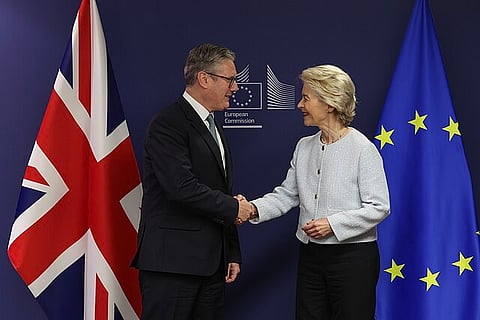

The European Union and United Kingdom announced coordinated sanctions on May 20, 2025, targeting Russia’s “shadow fleet” of oil tankers and financial networks accused of circumventing Western restrictions.
The EU’s 17th sanctions package focuses on nearly 200 vessels transporting Russian oil above the G7-imposed $60-per-barrel price cap, while the UK sanctioned 100 entities, including 18 shadow fleet ships and 46 financial institutions aiding sanctions evasion.
These measures aim to disrupt Russia’s ability to fund its war in Ukraine, which relies heavily on oil revenues.
Ukrainian President Volodymyr Zelensky praised the sanctions, stating they “hold perpetrators accountable” and emphasized the need for continued pressure to end the war. However, the EU and UK acted without immediate U.S. involvement, despite public appeals from European leaders.
German Foreign Minister Johann Wadephul urged the U.S. to reject Russia’s refusal to halt hostilities, declaring, “We also expect our U.S. allies not to tolerate this”. U.S. President Donald Trump, while claiming to “look at many things,” delayed new sanctions, citing concerns they might hinder peace negotiations.
The sanctions followed inconclusive talks between Moscow and Kyiv, the first direct negotiations in three years. Ukraine proposed a 30-day unconditional ceasefire, but Russia dismissed it, demanding preconditions such as Ukraine’s withdrawal from contested regions and abandonment of NATO aspirations.
Russian Foreign Ministry spokesperson Maria Zakharova framed the impasse as Kyiv’s responsibility, stating, “The ball is now in Kyiv’s court”. European officials, including German Defense Minister Boris Pistorius, accused Putin of “playing for time” to prolong the war.
The 60−per−barrel oil price cap, introduced in 2022, has lost effectiveness as global oil prices fell, allowing Russia to profit despite sanctions. The EU and UK pledged to lower the cap closer to production costs (30 per barrel) and intensify scrutiny of the shadow fleet, which uses aging tankers and opaque insurance to bypass restrictions.
European Commission President Ursula von der Leyen emphasized the need to “escalate pressure to achieve a ceasefire,” with an 18th sanctions package already in preparation.
The sanctions highlight a growing divide between Europe and the U.S. in addressing the conflict. While the EU and UK prioritize economic pressure, Trump’s administration favors mediation, fearing sanctions could harden Moscow’s stance.
Meanwhile, Russia’s shadow fleet continues to transport 85% of its oil exports, underscoring the challenges of enforcement in international waters. Analysts warn that without unified Western action, Putin’s strategy of prolonging the war while evading sanctions may persist.